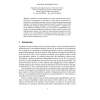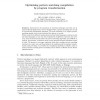906 search results - page 76 / 182 » Language and program design for functional dependencies |
HPCN
1995
Springer
15 years 1 months ago
1995
Springer
Abstract. Optimistic execution techniques are widely used in the field of parallel discrete event simulation. In this paper we discuss the use of optimism as a technique for paral...
ECEASST
2006
14 years 9 months ago
2006
Motivated by the promotion of rewriting techniques and their use in major industrial applications, we have designed Tom: a pattern matching layer on top of conventional programming...
DSD
2004
IEEE
15 years 1 months ago
2004
IEEE
Validation of programmable architectures, consisting of processor cores, coprocessors, and memory subsystems, is one of the major bottlenecks in current Systemon-Chip design metho...
102
click to vote
VLDB
1987
ACM
15 years 1 months ago
1987
ACM
FAD is a powerful and simple language designed for a highly parallel database machine. The basic concepts of the language are its data structures (which we call objects) and its p...
WCET
2007
14 years 11 months ago
2007
Worst-case execution time (WCET) analysis is indispensable for the successful design and development of systems, which, in addition to their functional constraints, have to satisf...



